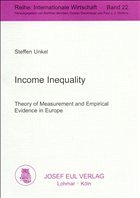Nicht lieferbar

Income Inequality
Theory of Measurement and Empirical Evidence in Europe
Versandkostenfrei!
Nicht lieferbar
The issues of economic inequality have been a subject of much research by philosophers, statisticians, political theorists, sociologists and economists. Questions of income inequality gained increased importance in recent years, especially in Europe. The present treatise brings together a number of studies concerned with the analysis of inequality both in theoretical and empirical context.First, a repertoire of the available methods to compare income distributions is intensively characterized. The range of indices discussed to value income distributions extends from simple statistical measures...
The issues of economic inequality have been a subject of much research by philosophers, statisticians, political theorists, sociologists and economists. Questions of income inequality gained increased importance in recent years, especially in Europe. The present treatise brings together a number of studies concerned with the analysis of inequality both in theoretical and empirical context.
First, a repertoire of the available methods to compare income distributions is intensively characterized. The range of indices discussed to value income distributions extends from simple statistical measures up to the generalized entropy class. In the center of the analysis are the inequality measures, which are most used in empirical studies. Especially the Gini-coefficient, which is important on positive points of view, and in normative respect the well-known family of indices by Anthony B. Atkinson are presented. An introductory look on the axiomatic approach to inequality measurement is closing this discussion. The author assesses some of the inequality measures in detail by a specific set of properties that might be necessary for an index to fulfill.
The second main part of the book is concerned with the analysis and evaluation of recent empirical evidence about income inequality in Europe. There is a wide range of levels of income inequality across the European nations. It is also shown, that a rising trend on inequality on disposable income is predominant in Europe. In addition to that, the treatise contains evidence on an 'Europe-wide' income distribution. On the empirical level this issue is emphasized by the lack of research so far. The last part is about inequality in European transition countries. We can see a significant rise in income inequality during the transition process.
Contents:
1. Introduction and Outline
2. Income Distribution and Inequality
2.1 Tools of distributional judgement
2.2 Pen's parade
2.3 Frequency distribution and log-normal distribution of income
3. Measuring Income Inequality
3.1 Positive measures: scatter parameter
3.2 Positive measures: concentration parameter
3.3 Normative measures
3.4 Information theory and inequality
3.5 An axiomatic approach to inequality measurement
4. Income Inequality in Europe
4.1 Empirical evidence on income inequality among European countries
4.2 Trends in income inequality in Europe
4.3 'Europe-wide' income distribution
4.4 Income inequality in transition economies in Europe
5. Summary and research Implications
First, a repertoire of the available methods to compare income distributions is intensively characterized. The range of indices discussed to value income distributions extends from simple statistical measures up to the generalized entropy class. In the center of the analysis are the inequality measures, which are most used in empirical studies. Especially the Gini-coefficient, which is important on positive points of view, and in normative respect the well-known family of indices by Anthony B. Atkinson are presented. An introductory look on the axiomatic approach to inequality measurement is closing this discussion. The author assesses some of the inequality measures in detail by a specific set of properties that might be necessary for an index to fulfill.
The second main part of the book is concerned with the analysis and evaluation of recent empirical evidence about income inequality in Europe. There is a wide range of levels of income inequality across the European nations. It is also shown, that a rising trend on inequality on disposable income is predominant in Europe. In addition to that, the treatise contains evidence on an 'Europe-wide' income distribution. On the empirical level this issue is emphasized by the lack of research so far. The last part is about inequality in European transition countries. We can see a significant rise in income inequality during the transition process.
Contents:
1. Introduction and Outline
2. Income Distribution and Inequality
2.1 Tools of distributional judgement
2.2 Pen's parade
2.3 Frequency distribution and log-normal distribution of income
3. Measuring Income Inequality
3.1 Positive measures: scatter parameter
3.2 Positive measures: concentration parameter
3.3 Normative measures
3.4 Information theory and inequality
3.5 An axiomatic approach to inequality measurement
4. Income Inequality in Europe
4.1 Empirical evidence on income inequality among European countries
4.2 Trends in income inequality in Europe
4.3 'Europe-wide' income distribution
4.4 Income inequality in transition economies in Europe
5. Summary and research Implications



